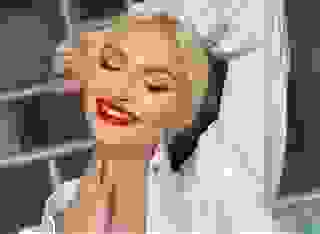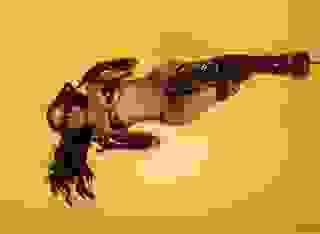- Romance
- Spring Green
Note: You can change font size, font face, and turn on dark mode by clicking the "A" icon tab in the Story Info Box.
You can temporarily switch back to a Classic Literotica® experience during our ongoing public Beta testing. Please consider leaving feedback on issues you experience or suggest improvements.
Click hereSpring Green
Things are never what they seem
Let a star be just a star
And a woman -- just a dream.
Dreams Are Best | Robert Service
Oh yes, life is change...because as Yeats' said -- 'things fall apart,' and the fall can be brutal and direct -- or -- such change may arrive softly, with the coming of a breeze. Sometimes change arrives on vast columns of marching men playing dark anthems, yet too, there are those few times when change comes as gently as the night, in the form of a woman, perhaps, if you're lucky. Our own cycles of life remind us -- or they try to, anyway -- that 'nothing lasts forever,' that we are here but for an instant and life will move-on dry-eyed without us after we leave. Still, for some people the very idea of change is foreign, the idea isn't welcome; it takes a while for the idea of change to take root and grow. Call these people slow learners if you like. And while you're at it, you'd better lump me in this last category. Slow, as in: it took me quite a while to figure out what was going on, and what it all meant.
So, to begin a recounting of these events -- something unexpected comes along and bang: you're in the middle of a big life crisis? Okay, like that's gonna make headlines? Hold the presses? Film at eleven?
Not a chance. No, the change I'm thinking of resides in memory so deep you might think of it as, well, almost a genetic thing. This kind of change is easy to miss because the process is so incremental -- change is small, slow, almost undetectable over a lifetime -- and it almost always happens out of sight. This kind of change doesn't jump out at you, rather it's faintest outlines begin to emerge in memory. And although this is my story to tell, I couldn't begin to do so without tracing a few of the faint outlines of my own 'genetic' memory. I'm hoping you might see parts of a greater story this way, because maybe, just maybe there are echoes of greater memories at play in the night, evidence of some larger process at work.
And I'll have to begin this story by describing the most unlikely hero imaginable. I want to paint a picture of an older man, a man getting on in years but not yet so withered and worn down by change that he has stopped wondering about time, and the meaning of it all. I'd have you picture a tall man, say around six feet tall, and stocky in a muscular way that reminds you of youth. He had hair on his head once upon a time, but now all that remains is a thinning silver fringe around the sides, and when you see this man in your mind's eye the one thing that will stand out most is his eyes. Cool and grayish-blue, the whites clear, they feel distant in a way but the closer you get the more you feel a certain penetrating warmth: you feel a contentedness in his eyes, perhaps an echo of this in his easy smile. You might see eyeglasses on the man as he reads a newspaper, but let's visit him in our memory as he was before our last trip together. Let's visit him in his office.
You'll see him wearing an expensive, well-tailored suit, clothing that seems a natural extension of his body. He stands behind a large mahogany desk; beyond him is a wall of glass and far below, the lights of a large city shimmer in golden glory. This man should be, in your eyes at least, the very picture of success. He is Homo-Americanus and quite proud of the fact, and though he is but mortal flesh, in his own way he is unchanging, unyielding -- immortal.
This man happens to be my Uncle Chuck, or Charles Wentworth Addington, Jr., and I use the word 'unchanging' advisedly, because for Charles change meant nothing at all unless he was the one in charge of it. Unless he'd massaged and shaped change -- and beat the ever loving crap out of it when it didn't perform as expected. Any other change was trivial, mundane, something to be dealt with by associates down in the Minor Bullshit Department. The type of change I've been alluding to, all that genetic hooey, tends to make a mess of things -- and Uncle Chuck didn't do messy -- at least not that I was aware of. That kind of change is unpredictable, and Charles Wentworth Addington, Jr. just wasn't an unpredictable, or even a spontaneous man. Spontaneous is combustion, often shocking, energetic and -- always messy. Uncle Chuck was the polar opposite; he was glacial, as cool as they come -- and as stonily deliberate and predictable as any glacier you've ever walked on.
Maybe he was too cool for his own good, because in the end he didn't embrace change. Very few do, especially men like Uncle Chuck. Change, like time, is a predator. Change is patient, steady, waiting and ready to line you up in it's sights -- and pull the trigger -- whether you happen to be ready, or not. Maybe that's why, I think, he tried to hide from change. Because unlike most of the things I associate with life, change rarely misses it's targets. Not even when men like Uncle Chuck get in the way, or protect the people they love from change.
But now's the time to get a few other details out of the bag and right up front: this story isn't altogether about Uncle Chuck, and it's not just about change, though maybe I should make that Change with a capital C right about now. No, this story is, in it's own roundabout way, a love story. Maybe love stories, as a matter of fact, layer upon layer of love, the kind that -- as long as there is memory -- never fades away. Falling in love is often a messy, unpredictable, and spontaneous affair, and falling in love often generates a little combustion of it's own, leaves a little black soot on your sleeves that's hard to wash off. I'm sure you get the picture, but if you don't, well, just remember as events unfold that things Change, and Change almost always comes along when you least expect it, whether you're ready for it or not.
◊◊◊◊◊
Uncle Chuck, it seemed to me, lived out most of his life in an office on the forty-eighth floor of what was at one time the tallest building in Boston, Massachusetts. Forty-eight was of course the top floor, and Chuck's office was the biggest one up there. Real nose-bleed territory, or so my father called it. And to give you proper context let's add that Chuck owned the building, and the bank in it, the land the building was on and a lot of the land around it. Chuck was rich in so many ways. So many ways no one understood. Not even Chuck.
He had one son, to whom he was devoted completely, my cousin Ham, or Charles Wentworth Addington, III. He was called Ham because he had fat cheeks -- that looked exactly like a hamster's. The image that often comes to mind when I think of hamsters is that they run endlessly in little stainless steel cages, in the corner of your bedroom, perhaps, when you were a kid. I don't like to say this now, because I find it odd even now, but that's about all I remember of Ham. He was a hamster in a little cage, running and running and never getting anywhere. If you think about the clicking of a hamster's little claws as it runs on it's treadmill, well, that is, it seemed to me, the little creature's life's work. That was Ham, always running and never getting anywhere. Something else, too; I remember thinking all those years ago that the hamster he kept in his room was much happier than he was, but I guess some people make their own treadmills no matter where they go, no matter the circumstance.
But, and this is important, more than anything else in the world, Uncle Chuck loved his wife Ruth. She was the light of his life, and while, perhaps, his love for her was just another manifestation of his desire to hold Time in his hands -- there was never any to doubt of his absolute love for her. She was beautiful, yes, but so much more than simple beauty shone through; her soul was of a timeless sort, one might even be tempted to call her's an unchanging beauty, and when I speak of Chuck as we move along you need remember her presence was always in the air about him, even if she wasn't physically with him. Let me add something in case I've confused you: what made her so staggeringly beautiful was the simple fact her beauty was so much more than skin deep. She was beyond nice. She'd come from old money yet she studied sociology, worked in soup kitchens and could always be found on Tuesdays volunteering at a hospital for crippled and burned children. Beautiful, and timelessly so, in so many ways. She was as beautiful on the occasion of Chuck's fifty seventh birthday, the day she passed away, as on any other day I knew her. Everyone at the party said so, right up until she suffered the stroke that felled her -- while she whirled about the room -- as ever the perfect hostess. She was his partner, in the best and truest sense of the word.
That was 1969, which I remember vividly as the Dawning of the Age of Aquarius (enter Chorus, stage left -- 'let the sun shine in'). Is it just me? Because I remember thinking the very air that we breathed was alive with change.
Or was 1969, as I now suspect, a vast opera that felt very much like Change -- but was instead a shimmering -- chimera? Some might call 1969 a period of manifest change, even Hegelian change, but now, after seeing where it all led I'm content to call it a False Spring. The long winter of our discontent has yet to lift, or so it sometimes seems, and the bleak streets of winter linger on.
Anyway, Aunt Ruth passed away that year, but our 1969 was about all kinds of Change: Nixon lying and Cambodia burning, hippies tripping and Led Zeppelin screaming about a Communications Breakdown ( -- it's always the same -- ), Barbie and Ken dolls and Kent State falling -- and something even happened on the moon, but who cares these days about stuff like that. Music defined my life back then, maybe it still does, but the song that plays in my heart now, as it did that summer, was called Yesterday and Today, by a group called Yes. I can't think of Chuck and Ruth and Ham without hearing that music passing by one more time.
And 1969 was also the year Ham left us, to fly helicopters in Vietnam. He returned, a decorated war hero -- in a flag-draped coffin -- a few weeks before Chuck's 57th birthday, a few weeks before Ruth passed. I think that was Uncle Chuck's first real experience with the spontaneous combustion Change can release. There was more change coming, of course, more than any of us knew, as it turns out, but let me say that Uncle Chuck came undone in the weeks before that birthday. So too did Ruth, and yet they seemed to be pulling out of that free-fall when...
But let me take another tack just now, show you a few other pieces of this puzzle before we get to the meat of the matter.
Ah, yes, my father, the missing part of this equation. My dad was the exact opposite of Chuck, his polar opposite. Chuck was Beacon Hill; Dad was The Cape. Chuck was Wharton; Dad dropped out of Harvard to go to Paris because it sounded like the thing to do. Chuck met Ruth at Penn and married her after a brief courtship; Dad was painting hookers on the Boulevard de Clichy one morning when an English girl happened by and, admiring his work, asked if he'd like to join her for tea at the Crillon. They married later that afternoon, or so the story goes, a large quantity of Pernod rumored to be a factor in their well-considered decision to tie the knot. But more on my mother in a moment; I need to talk about the dynamic between Chuck and my father just now.
These two brothers, it turned out, were more than just a study in contrasts: they were, rather, poised as mortal enemies, opposite particles of matter and anti-matter held apart by all the forces nature could muster. Their parents failed at the enterprise completely, by the way. I'll spare you the details. But, and this might be important, the root of the idea of genetic memory I alluded to earlier was buried deep within this fertile soil. What grew between them blossomed and reached for the sky, then as suddenly withered and died -- only to be reborn again and again, as though this cycle of hope and despair was the product of vast and inexorable influences between the moon and her tides. Once I asked my father about the difference between hate and love; he had no answer, and I think that summed up those two men.
My mom, on the other hand, has always been a rather contrary creature in and unto herself, a study in contradictions in her own right, so much so that her mere presence unsettles even the most well-adjusted people and, on more than one occasion, she was known to make Uncle Chuck consider a swan-dive from the top of his building -- just to get away from her. I'm not going to waltz into the DSM-IV and say she's bi-polar or has Multiple Personality Disorder; I will say that right up to this very day she's doing her very best to keep half the psychiatrists in London quite busy. Mad as a balloon, as Douglas Adams said more than once, but lovely nevertheless. She seems intent on living forever too, and as she believes this possible I won't be in the least surprised if she pulls it off.
Dad, on the other hand, punched out early. He'd had his fill of life by the time he was thirty, or so he told us one and all during one of his regular periods of self-examination; regardless, he was a free-spirit and died in his own free-spirited way, skiing in Chamonix. He was 59 at the time, and by then a decent if not very serious architect; when he passed I was in college and he'd just received word of Ham's death in Vietnam. Mom was, God bless her, still at his side. He soldiered on into the great void with a smile on his face even if he did cry a little. He was wondering, Mom told us later, if they served Pernod in heaven, and was apparently quite put out when she said she wasn't sure.
Dad's main vice, aside from my mother, was the sea, and that pure love of the sea was the one thing both my father and Uncle Chuck had in common. They both reveled in the mere idea of being at sea, they breathed the sea and I'm sure salt water ran in their veins, but there was a perverse quality to their lust. On reflection it took perhaps twenty years of passive observation to figure out exactly what had so distorted their sea-fever. And yes, it has something to do with genes and memory and yes, change. And this is where I came to play a small, supporting role in the unfolding drama of their lives.
As it turned out, they both enjoyed racing sailboats, and they seemed to enjoy racing against one another. When they were both out on the water, which was often, and when they were in reasonable proximity to one another, it was like watching Athenians and Persians at the Battle of Salamis. Splinters and shouted insults between boats, shaking fists and trembling lips, and then -- me. The little kid huddled just out of sight -- taking it all in. I was, it turned out, the last witness to their continuing war, to the unending, everlasting fratricide that defined our family's life. In the end, Dad stopped racing his own boat because he couldn't get insurance anymore, and that was the end -- for a time -- of my life on the water. I'm certain this was all a prudent choice on the insurers' part, as apparently sailing was just another venue for their little war, for them to tear each other to shreds, yet their tactical inexactitudes were not what the underwriters had in mind; still, while I was impressed at the time, you shouldn't be. Destroying sailboats in random displays of filial hatred is a game best left to addled children, and, who knows, maybe all this was just another genetic issue working it's way to the surface.
But even all that Death there was more Change in store for Chuck and myself; the sea kept calling us and eventually I returned to sailing, for you see, I too loved the water.
After Dad passed my sailing fires slowly burned down to embers, yet it was about that time Uncle Chuck caught the cruising bug; I would -- on the other hand and in short order -- become interested in girls -- and cars. Yet the sea was always there, and I soon found myself thinking about Dad and his boats. Soon I wanted to sail again, sail all the time, and Chuck provided both the means and, unexpectedly, the end.
And I think our coming together again was as inevitable as it was unavoidable, and Uncle Chuck and I discovered we both missed my dad far too much to let go of one another. Soon I discovered Chuck's 'hatred' had simply evaporated, and I have to admit it never dawned on me that what they had endured all their lives was a peculiar form of love.
Because frankly, I didn't know Chuck very well, had not the slightest idea what made the guy tick. Dad had always painted an impressionist's landscape of his brother: like a Seurat it made a peculiar sense from a distance -- but the closer you got all form dissolved into blurry chaos -- and while clearly in the noise there was color of a sort, in my vision of Chuck the truth was not so easily discovered -- without a little distance, anyway. Yet I accepted this landscape without question, and accepted these distortions as our collective Truth.
I had so much to learn, and the world's worst teacher as my guide.
After college I took a year off and wandered through France, my grandfather's homeland -- and I did so on foot mostly, but spent a few weeks on a canal barge -- and while I might have been following Dad on his Parisian idyll, there were deep familial roots in France's ancient soil, and I had yet to feel them before that trip. After father's death I understood I needed to feel these roots, these connections. And I say 'need' intentionally, like we need air to breathe, like without exposure to these influences we might as well shuffle off this mortal coil. Anyway, call France an 'Elective Affinity' on my part; Goethe wouldn't give a damn and it's as close to the truth as words can take us. Besides, I found after graduation I had this complete and inexplicable desire to paint landscapes and eat snails drenched in garlic-butter. Boston offered little to satisfy these urgings and Mom decided to move back to England as well -- so off I went.
But I note here that Chuck wanted very much that I come work in the bank, follow in his footsteps, and oddly enough it was this impulse more than any other that set me off on my wanderings. There is, you see, a certain gravity to the footsteps we follow. Uncle Chuck was a little miffed and I'm sure Dad was laughing his ass off while arm wrestling Toulouse Lautrec over a bottle of absinthe in the Parisian whorehouse that must surely be his heaven.
◊◊◊◊◊
I had been around enough docks and boats by that time to know that families are like tides. There's an ebb and flood to our anguish and joy, dangerous currents swirl around the rough edges of their need. But there's a sort of inevitableness within these cycles, change is predictable within a certain range of movement. A family's pain is often most apparent after a bad storm -- but time heals all wounds, doesn't it? -- even if, after all is said and done, a little pain remains. I suppose it's just our nature to go with the flow, so in time Chuck got past the desire to control everything and accepted my departure. You might say he was learning to accept change. Or perhaps the gravity of which I spoke flowed more deeply through our veins than even I suspected.
When I came back from France I started at The Fletcher School, at Tufts, and was taken with the grand idea that I might turn out to be a decent diplomat. So, I set my sights on working for the State Department, and Uncle saw this as well within a range of acceptable outcomes and gave up on the idea of my working on the 48th floor; soon he was inviting me, and an endless if stately progression of girlfriends, out for a spin on the Bay on his old racing boat, and then almost every weekend, too. Then it was every weekend. On Thursday evenings in the summer it was soon a given I'd crew during the informal races that took place in the waters off downtown. We soon developed, you see, a little gravity of our own, for I needed him as much as he did me.








